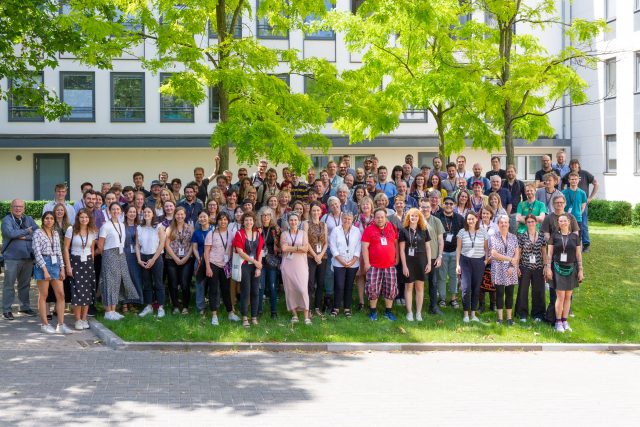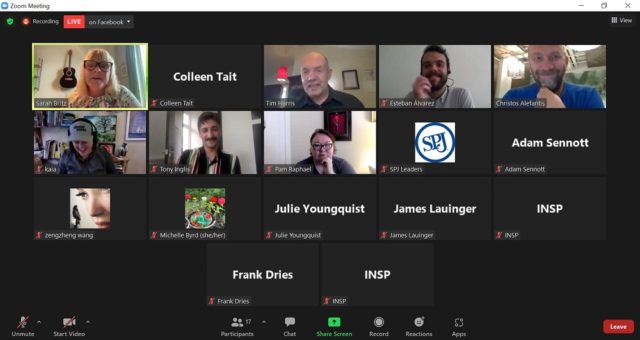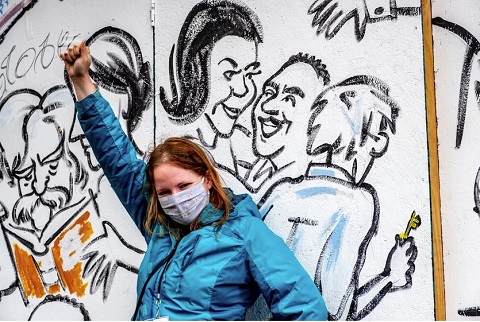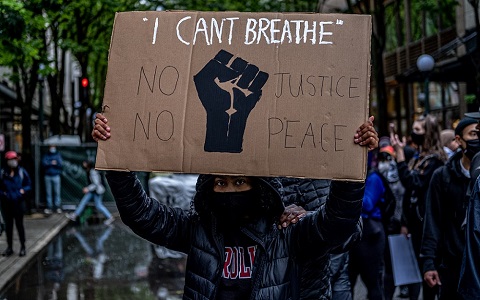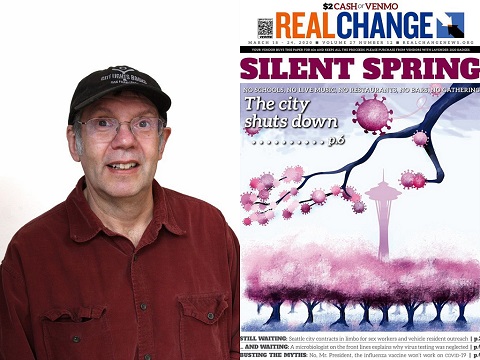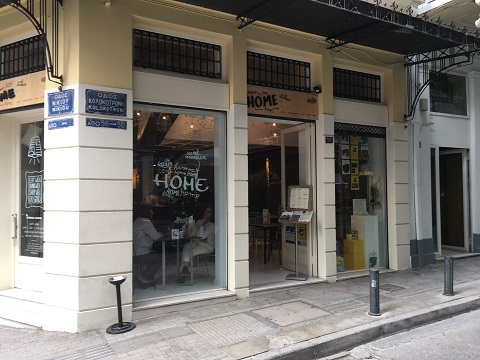During the Global Street Paper Summit in Athens, Nicholas Voulelis, editor of Efimerida ton Syntakton (The Journalists’ Paper) gave an inspiring introduction to his unique newspaper, which is run as a cooperative of over 100 journalists.
By Laura Smith

How many journalists does it take to produce one of Greece’s most trusted and successful daily newspapers?
The answer lies with Efimerida ton Syntakton (The Journalists’ Paper) and is much higher than you might think.
Launched in Athens 2012, Efimerida ton Syntakton (Ef Syn) rose from the ashes of respected left-wing paper Eleftherotypia (meaning “freedom of the press”) – one of the early victims of Greece’s economic crisis.
With few options in the Greek press, which was at the time crippled by job cuts and possessed a rancid reputation for partisan reporting, journalists from Eleftherotypia and other bankrupt papers decided to go it alone.
Together they raised the capital to launch Ef Syn, which is run as a cooperative owned and controlled by 130-150 journalists. Veteran Greek writer and editor Nicholas Voulelis came out of retirement to become the left-leaning paper’s director.
During the INSP Global Street Paper Summit‘s first visit to Greece this June, he told his international media colleagues that he saw many similarities between Ef Syn and street papers.
“I believe there are many things that unite us, and very few that divide us,” he said. “Above all, however, I believe that we meet squarely in terms of our interests for the well-being of our fellow man when plagued with poverty and injustice.”
Διάλογος στη σωστή κατεύθυνση
Editorial
Η κυβερνητική πρόταση για τη συνταγματική αναθεώρησηhttps://t.co/5OnTZBumJy pic.twitter.com/ejDjW5oFY6— EFSYN (@EFSYNTAKTON) July 27, 2016
From the beginning, Voulelis and his army of journalists and editors vowed to be a voice for the people of Greece as a truly independent paper.
Voulelis says this is a rarity in Greece. He added that Ef Syn’s independence has allowed it to become an honest and reliable news provider in Greece, free from the shackles of media barons or business tycoons chasing their own political or financial interests.
“A media provider cannot be independent if it continues to participate in old or new networks of power sharing,” he said. “We declared from the very beginning that [we would provide] a critique of public discourse – and critique of those either in power or challenging for power – that was independent from political, economic or media sector interference.
“Our newspaper aims to cover a wide spectrum of society, to serve readers that want a newspaper that is not deceiving or misleading, and offers real investigative journalism and analysis of every facet of daily life.”
In a country where “most newspaper owners are intertwined with economic and political centres of power, and dependent on the latter for a great degree,” Ef Syn’s independence and pluralism are not just symbolic catchphrases.
“Since the beginning we have stuck to our founding principles as a bastion for pluralism; unafraid to tell the truth and providing a platform for a wide array of views and ideas, promoting press freedom and democracy,” Voulelis added.
 Amid severe austerity and endless economic uncertainty, the truth still sells in Greece.
Amid severe austerity and endless economic uncertainty, the truth still sells in Greece.
Since the first edition hit newsstands on 5 November 2012, Ef Syn’s circulation and readership has soared. Despite limited resources and capital, the paper quickly became a heavyweight challenger in terms of nationwide circulation, readership and advertising market.
Later this year, Ef Syn will celebrate four years of circulation. A solid reputation for accurate and unbiased reporting is key to its success. This is largely down to its autonomy, said Voulelis, achieved thanks to Ef Syn’s unique structure as a thriving cooperative, built on strong foundations of equality and pluralism.
“Our staff is centred around the concept of pluralism – it’s a prerequisite for guarding the newspaper’s autonomy,” he explained. “This concept is assured through the cooperative structure and organisation of the newspaper. The newspaper belongs to and is controlled by the people who work for it.”
Voulelis pointed out that individual members of this cooperative provided the capital to start Ef Syn. It turned out to be a wise investment, as the paper is now self-sustaining
“Since the beginning we have stuck to our founding principles as a bastion for pluralism; unafraid to tell the truth and to promote press freedom and democracy.”
Newsstand sales and advertising revenue account for all of the paper’s earnings. It pays upfront for the printing and distribution followed by other expenditures including taxes, social security, renting office space and electricity and internet bills.
What is leftover goes to employees. From receptionists to senior editors, Ef Syn staff receive the same salary of around €1000 a month (€800 after tax). This figure was agreed on by all staff.
Many editors and reporters willingly took pay cuts to join the cooperative. But while their wage may sound modest to professionals in other countries, Voulelis assured that this is a good pay packet in the current Greek context. “Unfortunately, after all these years of crisis we have hundreds of thousands of people working for €300/400 a month, so €800 is very good.”
Voulelis: we refuse to muck rake, but cover issues ignored by mass media with objectivity. #INSP2016
— Emily Green (@GreenWrites) June 16, 2016
Putting out a daily publication with so many journalists could well be a recipe for chaos. Yet the Ef Syn team has somehow made it work. Voulelis explained that responsibility of the day-to-day running of the newspaper, its editorial content, and managing the staff rests with him.
The editorial team is comprised of a managing editor and a group of six to nine senior editors and editors-in-chief, who represent different editorial departments. This group meets two to three times a day and has the responsibility for putting out the newspaper on a daily basis.
“You have to keep in mind that when 150 people gather to publish a street paper they don’t have the same ideas, the same mentality, the same experiences or backgrounds or same ideas for the future,” Voulelis admitted.
“It is a very difficult task but I think [the process] is evolving – it changes every day. That’s why I insisted on the editorial team gathering two and three times every day. We are discussing everything every day, trying to reach a consensus. It is a unique situation and also an experiment.”
Reacting to a murmur of amazement at this intensive meeting agenda, as scores of editors in the audience marvelled at getting a paper out with all that talking, Voulelis admitted it’s an ongoing challenge.
“It is a daily lesson and experience of democracy,” he added, smiling. “It is very difficult because you have 130-150 people working around the paper and every day you have problems which other papers have a better way of solving. It is a very interesting experience, which is why I’m still here.”
Great final #INSP2016 keynote: @EFSYNTAKTON's Nicholas Voulelis. #Cooperatives #journalism pic.twitter.com/J9BT0atRI6
— Maree Aldam (@mareealdam) June 16, 2016
Ef Syn’s editorial remit is equally expansive. It covers everything from politics to economy, sports and the arts. But the paper prides itself on providing a platform for marginalised groups and has backed actions for women’s rights, people with disabilities, refugees and the LGBT community.
“Our newspaper opened many doors in terms of news coverage on issues that are usually ignored by practically all our mass media,” he added.
“We have always emphasised issues of solidarity not just because of the crisis and its consequences but because it is one of the axis of our media philosophy. In general we support the social groups giving a voice to those who are not visible in other mass media.”
This includes regular coverage of the many grassroots social enterprises that emerged in crisis-struck Greece via a weekly section dedicated to solidarity movements at a community level. It also ran a campaign called Take my Hand, which hosted events in several municipalities for refugee children.
Ef Syn has also given voice to those experiencing homelessness in poverty by, in part, working with the Greek street paper Shedia (meaning “raft” in English).
Voulelis explained that over the past six months, Ef Syn has published many articles about Shedia’s initiatives, including its football matches in Syntagma Square between homeless players and refugees, Shedia’s campaigns at the Homeless World Cup, and the Global Street Paper Summit taking place in Athens.

He also expressed an interest to collaborate further with Shedia and especially with its vendors.
“We’d like to get information from the sellers of Shedia about new ways and methods of finding stories, and what they consider important criteria in fleshing out an important story and obviously explore their knowledge on the streets,” he said.
The respect Ef Syn’s director has for the street paper network is mutual. Tim Harris, founder of Seattle-based street paper Real Change, was one of many street paper delegates impressed by Ef Syn’s unique yet hugely successful model.
“This is tremendously inspiring because I think that there are issues of journalistic integrity all over the world,” he said. “In the U.S., especially, it’s a huge issue that people have lost faith in the media and the high levels of integrity that this project brings is inspiring – it seems to offer a path forward for media. This is a fantastic example.
“Ef Syn offers hope for independent journalism by putting their values first and modelling what integrity looks like. That they’re succeeding in this in such a tough environment tells us that truth still sells.”




